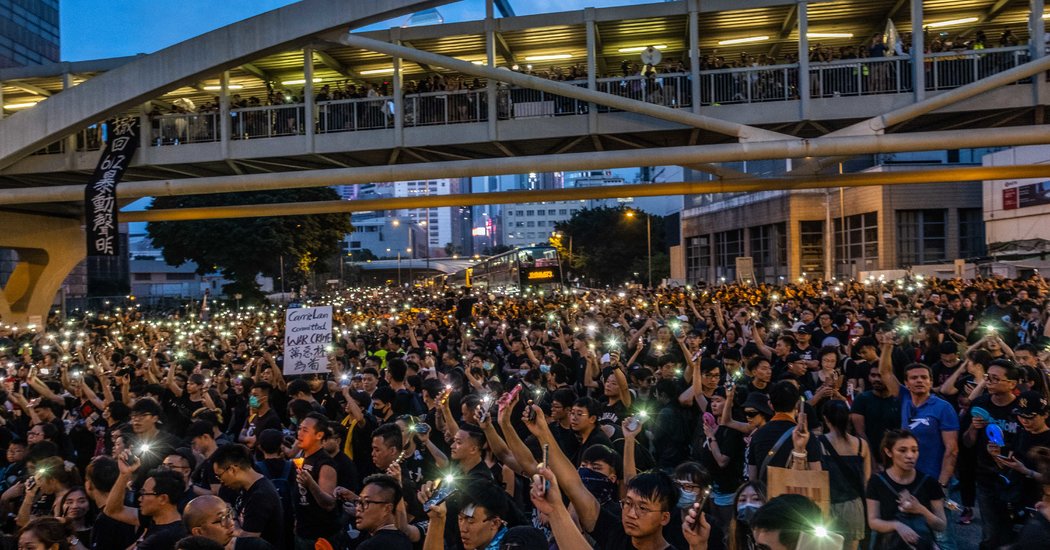HONG KONG — Protesters poured into the streets of Hong Kong on Sunday with renewed determination and a lengthening list of demands, rejecting the government’s retreat on a contentious extradition bill and extending the political crisis gripping the semiautonomous territory.
Hong Kong’s embattled leader, Carrie Lam, shelved the bill on Saturday and followed that up with a rare apology on Sunday evening, actions that pro-democracy activists dismissed as too little, too late. And the sheer size of the demonstration — organizers gave an unverified estimate of close to two million of the territory’s seven million people — made clear the public remained unsatisfied.
Many of the protesters said they were disappointed with Mrs. Lam’s statement, saying it seemed insincere.
“She only did it under pressure,” said Leo Cheng, a 19-year-old student.
The marchers’ resolve is sending tremors to Beijing, where President Xi Jinping’s carefully nurtured image of strength and competence is being put to the test.
“They want to send a message to Beijing,” said Willy Lam, an adjunct professor at the Center for China Studies at the Chinese University of Hong Kong. “If Beijing wants to do something that really infringes upon Hong Kong’s basic value, Hong Kong people will turn out in force, again and again, to pour out their discontent.”
The marchers filled broad avenues and ran the length of downtown Hong Kong, parents with their children, groups of students and numerous retirees. Reflecting their changing mood, most dressed in black, a stark change from the white most wore the previous week.
They chanted and carried signs listing their demands: the complete withdrawal of the bill, not just an indefinite suspension; an impartial investigation into the police use of force during Wednesday’s clashes with protesters; and rescinding the official description of that protest as an illegal riot, which could expose anyone arrested during the violent demonstration to long jail terms.
In contrast to Wednesday, police officers stood by on Sunday in a crowd-control role, with no altercations or arrests reported.
There were no immediate plans for another march. But labor unions, which tend to be weak in Hong Kong, have called for different sectors of society to take turns holding strikes of an hour or two on Monday, including a general strike by many businesses early Monday afternoon.
Perhaps most broadly, the demonstrators are increasingly demanding the departure of Mrs. Lam, the chief executive of Hong Kong. The many calls for her resignation — and increasingly, for those of her ministers for justice and security — seemed to put in question her continued viability as the territory’s leader.
“Some heads need to roll,” said Emily Lau, the former chairwoman of Hong Kong’s Democratic Party and still a leading voice in the territory’s democracy movement.
It is far from clear whether that will happen. China’s leaders want to avoid triggering the public selection process for a successor, as Mrs. Lam does not have an obvious political heir.
However, a commentary on Sunday in the People’s Daily, a news outlet run by the Communist Party, backed the Hong Kong government. But, in a departure from previous commentaries in the state news media, it conspicuously failed to mention Mrs. Lam.
In Mr. Lam’s estimation, that omission speaks volumes.
“Her days are numbered,” he said. “Beijing has totally lost confidence in her ability.”
Secretary of State Mike Pompeo said that the United States is monitoring the protests in Hong Kong and said the situation would be “among the issues” discussed when President Trump meets with Mr. Xi at the end of June for the Group of 20 summit in Osaka, Japan.
“We see what’s happening, what’s unfolding in Hong Kong,” Mr. Pompeo said on “Fox News Sunday.” “We’ll see what Lam’s decision is in the coming days and weeks ahead.”
Over the weekend, Mrs. Lam, a no-nonsense civil servant who typically sticks to her positions, did not act as though she was considering stepping down. On Saturday, she said she would delay indefinitely a vote on the bill and on Sunday night issued an unusually apologetic statement, saying that she would “take on criticisms in the most sincere and humble way.”
But if those steps were aimed at mollifying the protesters, they seemed to have the opposite effect, half-measures that, paired with the harsh police conduct on Wednesday, further inflamed the crowds.
“I did not come out last Sunday, but today she forced me to come out,” Sze Li, a 30-year-old office worker, said of Mrs. Lam.
It was the third time in a week that masses of Hong Kongers had shut down the territory’s central roads over a proposal to allow extraditions to mainland China, a step that rights activists and others fear would chip away at their remaining freedoms by exposing them to China’s opaque legal system.
The bill has fed rising fear and anger over the erosion of the civil liberties that have long set this former British colony apart from the rest of the country. The local authorities have also rejected demands for free elections and ousted opposition lawmakers, and critics say Beijing’s supporters are dimishing the independence of the territory’s courts and news media.
It was a resounding statement that Mrs. Lam’s political crisis was far from over. Finding little support from her superiors in Beijing, Mrs. Lam is still trying to thread the needle of restoring order without making concessions that would weaken her standing.
Sunday night’s apology, distributed as thousands of protesters converged on the Legislative Council building more than six hours after the march began, was the first time she had acknowledged fault in the debacle.
“The Chief Executive admitted that inadequacies of the government’s job has caused major contradictions and arguments in Hong Kong society, making many citizens feeling disappointed and upset,” the government said. “The Chief Executive apologizes to Hong Kong citizens for this, and promises that she will take on criticisms in the most sincere and humble way, striving to improve and serve the general public.”
At this juncture, Mrs. Lam is no closer to passing her unpopular legislation, which she had pushed since February as necessary to address a murder case that could only be tried in Taiwan. Critics see it as a Trojan horse that would allow Beijing to target activists, journalists and others in Hong Kong with dubious charges.
And she is now facing an expanding list of demands from the protesters, who were outraged by the harsh police response last Wednesday when some marchers tried to storm a government building, with a few throwing bricks and other projectiles at officers in riot gear. The police pushed back, hitting the protesters with batons, rubber bullets, pepper spray and more than 150 canisters of tear gas.
On Sunday, marchers waved more signs about the conduct of the police than about the extradition bill. The chants were varied: “Carrie Lam step down!” “Withdraw the bill!” “We are not rioters!” “Release the arrested students!” Some carried blown-up photos of a bloodied demonstrator from Wednesday.
“Last week, there was only one thing we were marching against,” said Katherine Lam, a 39-year-old data analyst. “But this time, there are a lot more reasons.”
The protest on Wednesday, a mostly leaderless act of civil disobedience organized through social media, came together to prevent legislators from discussing the bill. Tens of thousands of demonstrators blocked roads near the Legislative Council building, filling the streets of the Admiralty neighborhood in a scene reminiscent of 2014 pro-democracy Umbrella Movement.
Last Sunday’s march, which organizers say was attended by more than a million people, was entirely peaceful, with no arrests reported. So was this Sunday’s, which the police said as attended by 338,000 people were in the march at its peak.
But that figure was limited to people who were on the roads of the original procession route approved by the police, while huge throngs marched down parallel roads.
The death of a man who fell from scaffolding after unfurling a protest banner late Saturday injected additional emotional weight into the demonstrations. Hundreds of people gathered on Sunday to remember the man, whom the police identified as a 35-year-old with the surname Leung.
The man has rapidly become a symbol of the movement, earning the nickname “Raincoat Martyr” for what he was wearing at the time of his death. Mourners lit incense and left white lilies and roses where he fell, while many marchers carried white flowers or ribbons.
“His sacrifice really does show that the government is still ignoring how the citizens, how the students feel,” said Anson Law, 17, a high school student. “The people want to show their will.”
It remains to be seen whether Mrs. Lam can regain the trust not just of Hong Kong’s residents, but among the business community that had supported her and in Beijing. Even her reliable allies as she pushed the bill have begun to splinter; one pro-Beijing lawmaker, Regina Ip, called for an apology hours before Mrs. Lam offered one Sunday night.
Mr. Lam, of the Chinese University of Hong Kong, said Beijing would be unlikely to accept Mrs. Lam’s resignation if she were to offer it right now, but said the odds were rising quickly that she might not be able to finish the three years remaining in her five-year term.
At this point, Mrs. Lam’s departure would just be a starting point.
“I feel that Hong Kong can still be saved,” said Kris Yeh, a 20-year-old aviation student. “Through my anger, I feel a bit of hope.”

















